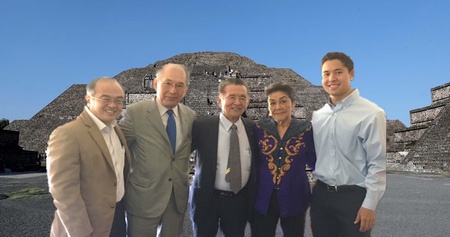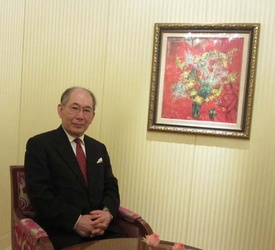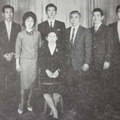What is the primary function of the Association of Nikkei & Japanese Abroad (KNK)?
My main task as president is to administer and operate, with clarity and rigor, all the projects of the KNK, such as the Convention of Nikkei & Japanese Abroad, the implementation of training programs for Nikkei interns in JICA, as well as guiding Nikkei students in Japan, assisting Nikkei currently residing in Japan, heading the public relations of Nikkei societies abroad, and expanding knowledge concerning Japanese migration, in general.
I would like to emphasize that the origins of [the Convention for Nikkei and Japanese Abroad] are an expression of gratitude towards the support Nikkei received in other countries after WWII. During the postwar period (1946-1952), the USA, Canada, Central and South America and even Mexico, donated relief food, clothes and medicine to Japan, dubbed “LARA rations” (Licensed Agencies for Relief in Asia), that totaled an aggregate value of approximately 40 billion yen. Twenty percent of all this support came from Nikkei located in the USA, Canada and Latin-America—Mexico.
This was support that Japan highly appreciated, and in 1957 in Tokyo, the “Fraternal Convention for Nikkei Abroad” was held to express their profound gratitude, directed by members of Parliament. In 1960, under the updated name “Second Convention of Nikkei Abroad”, the Association of Nikkei & Japanese Abroad was put in charge of its organization.
What are the current and future ideals of the role that Nikkei must perform in their respective countries?
What I hope will be coming from Nikkei is that they contribute to the development of their country of residence, as model citizens, sustaining interest in Japanese culture and society, and understanding Japan. I also expect them to take on the role of a bridge between their country of residence and Japan, continuing efforts to strengthen the bond shared by Nikkei around the world.
What does “Nikkei” mean to you?
I believe that the term ‘Nikkei’ is attributed to Japanese who relocated to another country and then obtained either citizenship or a permanent residence within that country, as well as to their descendants. At the same time, I am also aware that in Japan there are ideas of including (non-Japanese) spouses of Japanese nationals and their before-mentioned descendants, as well as even people who are interested in activities in Nikkei communities and actively participate in them despite not having Japanese origins.
Could a person be considered Nikkei even if they do not have Japanese ascendancy if they share Japanese mindsets or have interests in Japanese culture that rival or even surpass those Nikkei?
I believe that the possibility of that will continue to grow from this point forward. In fact, the JICA has been inviting these sorts of people to Japan under the internship programs designated for Nikkei for years now.
Since when has the term “Nikkei” been used to refer to the descendants of Japanese abroad?
I don’t have an exact knowledge of that. However, in literature written in Japanese the term ‘Nikkei shimin’ (Nikkei citizen) appears in Hokubei nenkan, published in Seattle, USA as early as 1928. And the term ‘Nikkei’ itself first appears in The New York binran published in 1948.
If you could, could you name five Nikkei that are, in your opinion, the most noteworthy of all times, and the reasons you think that?
You’ve surely heard the names of Senator Daniel Inouye, Mr. Norman Mineta—a former Secretary of Commerce and Transportation in the USA, the former president of Peru Alberto Fujimori, and Mr. Carlos Kasuga who founded the PanAmerican Nikkei Association. Beyond these individuals, there are countless Nikkei that shine through in the worlds of sports, culture, the arts, economy, the sciences, etc. However, there is no such thing as a standard through which one could evaluate any of these people fairly, and so I could simply not possibly name five noteworthy Nikkei.
What did it mean to you, the fact that it was Nikkei Athletes, such as Rui Hachimura who held the flag and Naomi Osaka who lit the pyre in the inaugural ceremony for the previous Olympic games?
While watching the inaugural ceremony for the 2020 Tokyo Olympic Games, I felt the followings: Both are the world-class athletes in basketball and tennis, respectively, who make Japan proud. It was the right choice to make them the flag-bearer and lighter of the pyre. In Japanese society, we can see how internationalization (including interracial marriage) and multicultural co-existence are advancing at an accelerated rate.
What is your opinion on Nikkei currently living in Japan?
Many Nikkei arrived as workers sometime during the mid-80s, to compensate for a lack of workers in Japan at the time. The number of Nikkei workers and their family is around 300,000; therefore, Japan has the third largest Nikkei community after Brazil and the United States. Because of this, we can surely say that Nikkei have contributed to the economic development and internationalization of the country, as well as to intercultural and interracial harmony.
Could you give a message for the whole Nikkei community?
For me, Nikkei are a people who have overcome great difficulty and have contributed to the development of their respective countries. They also made great efforts to understand Japan as a country and to promote the culture and values to their countries. They are always the first to come to support Japan when we faced hardships and natural catastrophes.

Conclusions
The modern concept of who is Nikkei has continually evolved in response to the times in which we live. Even the distribution of Nikkei across the world has varied, and new ideas and tendencies will surely come up in the future, reflecting the situation. We hope to never lose our love for the Japanese culture, language, customs that bind Nikkei together. Regardless of our nationalities, we always keep a sense of gratitude within us, we want to help Japan when it needs our help. After all, Japan is the country from which our ancestors chose to emigrate more than a century ago and to which some have chosen to return to study or to settle permanently or temporarily.
© 2022 Alberto Teramoto




